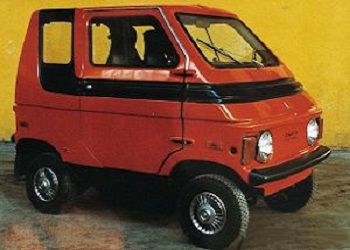Throughout the 1950s and 1960s, Italian coachbuilder Zagato was a byword for motoring excitement-a dream factory making strikingly styled sports cars.

Zagato Zele 1000 1972
- YEAR REVEALED 1972
- PLACE OF ORIGIN Milan, Italy
- HISTORICAL STATUS production car
- ENGINE electric motor
- MAXIMUM POWER unknown
- LAYOUT rear-mounted engine driving the rear wheels
- BODYWORK two-door, two-seater sedan
- TOP SPEED 25mph (40kph)
- NUMBER BUILT approximately 3,000 (all Zagato electric vehicles)
So no wonder visitors to the 1972 Geneva Motor Show were shocked at the company’s display. It’s new car was 77in (196cm) long, and could manage 25mph (40kph) in eerie silence. The rationale for designing the Zele was straightforward: Zagato was in trouble, its traditional market for handmade Italian GT cars quickly eaten away by cheap rivals such as the Ford Capri, Opel Manta, and Datsun 240Z.
Zele provided a new direction for the Italian company, founded in 1919. The Zagato Zele 1000 stood for the wattage available from its Marelli electric motor attached to the rear axle, fed by four 24-volt batteries. It proved a prescient move because, by the time the boxy little Zele was rolling down Zagato’s production line in Milan in 1974, the global fuel crisis spurred on by Middle East turmoil was biting hard.
Alternative fuel vehicles were in vogue, and by 1975, Zele annual sales were 225. Zagato had distributors in the US (Elcar) and Britain (Bristol); a van and an open golf buggy, perfect for Florida, were developed by 1978, and the 1981 Nuova Zele offered four-seater accommodation.
Zagato continued to make electric cars until 1991, by which time the fortunes of its specialized car coachwork business had been revived thanks to exciting co-productions such as the Aston Martin Vantage Zagato and Alfa Romeo SZ.